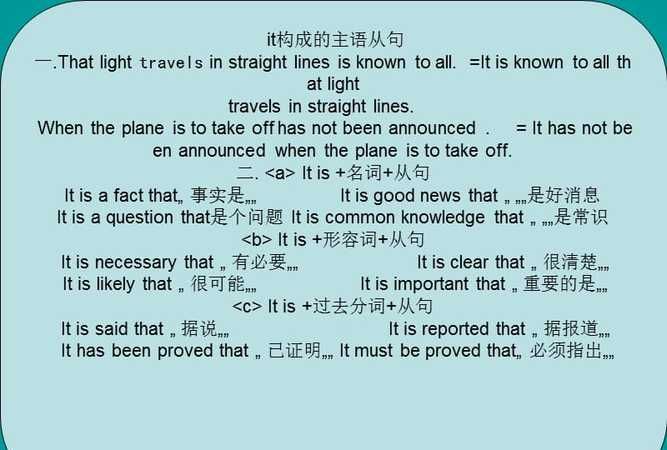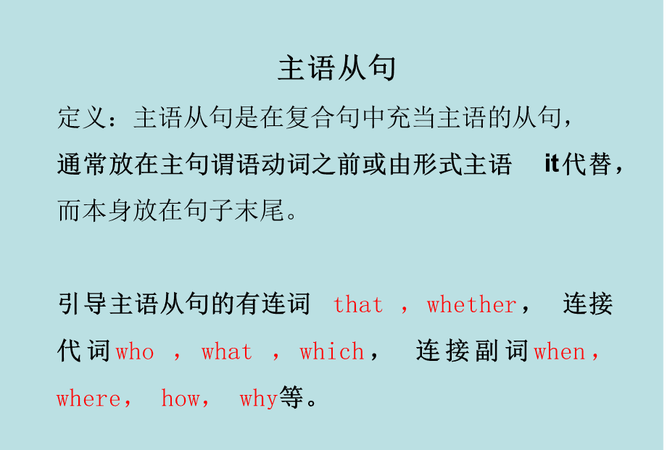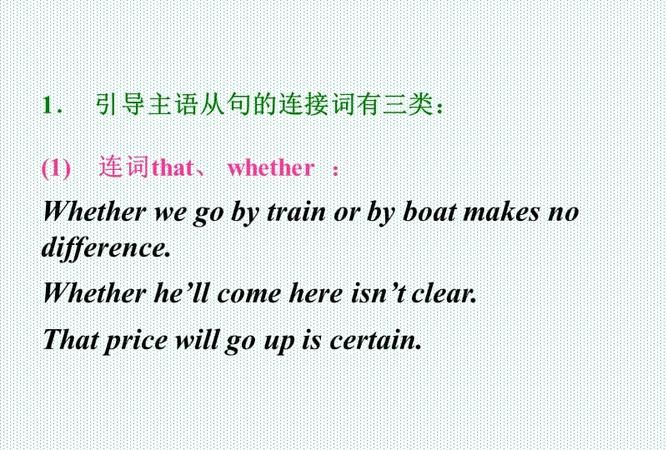本文目录
主语从句的从句部分
主语从句
主语从句(Subject Clause)
定义:如果一个句子在复合句中充当一个主语,那么这个句子就是主语从句.
第一部分:常规主语从句,即句子在复合句中充当一个主语
(1)That he finished writing the composition in such a short time surprised us all.
(2)Whether we will go for an outing tomorrow remains unknown.
(3)Who will be our monitor hasn't been decided yet.
(4) Whom we must study for is a question of great importance.
(5)What caused the accident remains unknown.
(6)Whatever you did is right.
(7)Whose watch was lost is unknown.
(8)What we need is time.
(9)What we need are good doctors.
小结:
(1)引导主语从句连词有that,whether,who,what,whatever等
(2)连词位于句首不能省略
(3)主语从句大多数情况下视为单三,但也有例外,如例9
第二部分:为了防止句子头重脚轻,通常把形式主语it放在主语位置,真正主语搁置于句末
(1)It is certain that he will win the match.
(2)It is true that he has made a very important discovery in chemistry.
(3)It is very likely that they will hold a meeting.
(4)It is strange that he should do that.
(5)It is important that we all should attend the meeting.
(6)It is strange that the man should have stuck to his silly ideas.
(7)It is a pity that we won't be able to go to the south to spend our summer vacation.
(8)It is still a mystery what caused the accident.
(9)It is said that he has gone to shanghai.(=He is said to have gone to shanghai)
(10)It is known to all that the gun powder was first invented by the Chinese.
(11)It is suggested that the work should be done with great care.
(12)It seems that he has seen the film.(=He seems to have seen the film)
(13)It happened that the two cheats were there. (=The two cheats happened to be there)
小结:
(1)以that 引出的主语从句,常以形式主语it引导. It is +形容词/名词/某些动词ed + that 从句.
(2) 在有些that从句中要用虚拟语气 (should+do/should+have done)例句4,5,6,11.
主语从句与宾语从句两者的用法和在句中的作用是不同的,下面从它们的各自用法,介绍:)
一.主语从句
主语从句 定义:在句子中担当主语的是一个从句,这个从句就叫做主语从句。
主语从句是在复合句中充当主语的从句,通常放在主句谓语动词之前或由形式主语it代替,而本身放在句子末尾。
1. It 作形式主语和it引导强调句的比较
It 作形式主语代替主语从句,主要是为了平衡句子结构,主语从句的连接词没有变化。而it引导的强调句则是对句子某一部分进行强调,无论强调的是什么成分,都可用连词that。被强调部分指人是也可用who/whom。例如:
It is a pity that you didn’t go to see the film.
2. 用it 作形式主语的结构
(1) It is +名词+从句
It is a fact that … 事实是…
It is an honor that …非常荣幸
It is common knowledge that …是常识
(2) it is +形容词+从句
It is natural that… 很自然…
It is strange that… 奇怪的是…
(3) it is +不及物动词+从句
It seems that… 似乎…
It happened that… 碰巧…
(4) it +过去分词+从句
It is reported that… 据报道…
It has been proved that… 已证实…
3. 主语从句不可位于句首的五种情况
(1) if 引导的主语从句不可居于复合句句首。
(2) It is said , (reported) …结构中的主语从句不可提前。例如:
It is said that President Jingo will visit our school next week.
(3) It happens…, It occurs… 结构中的主语从句不可提前。例如:
It occurred to him that he failed in the examination.
(4) It doesn’t matter how/whether …结构中的主语从句不可提前。例如:
It doesn’t matter whether he is wrong or not.
(5) 含主语从句的复合句是疑问句时,主语从句不可提前。例如:
Is it likely that it will rain in the evening?
4. What 与that 在引导主语从句时的区别
What 引导主语从句时在句时在从句中充当句子成分,如主语.宾语.表语,而that 则不然。例如:
What you said yesterday is right.
二:宾语从句的几个特征:1、引导词:what\which\whose\when\whether\if\where
2语序:宾语从句必须是用陈述语句。
如:I think that you must work harder.
宾语从句的引导词、连接词的区别、否定转移等现象。
(1)表达时间的几个句型:一般用when或者是what time:
What time will the train leave?
由于时刻都是固定的,也可以用一般现在时代替一般将来时:
What time does the train leave?
(2)时间的表达方式:8:19(nineteen past eight),7:57(three to eight),在时间的中间也可以加上分的单词(minutes)
(3)had better +动词原型。意思是提要求,建议。但是上下级不能用这种方式,因为语气太重:
You had better give up smoking .
(4)sb leave sth +地点
I left my book in my classroom yesterday.
(5)may I have your name(address\age)?一般询问对方的年龄、名字等,不要习惯以前的问法,这样很不礼貌,而是要采访上面的问法。以前的习惯是:how old are you? \what's your name?
(6)修饰名词的代词次序:限-描-大-形-年-颜-籍-物-类+名词:
this is a bridge.
This is a beautiful bridge
补充:从句的语序永远是陈述句。

主语从句例句及翻译
1、That he is still alive is a wonder.
2、That we shall be late is certain.
3、That he should have ignored the working class was natural.

4、That she is still alive is a consolation.
5、That she became an artist may have been due to her father's influence.
主语从句有哪些
主语从句在复合句中作主句的主语,引导主语从句的词有从属连词that, whether以及连接代词who, what, which, whoever, whatever, whichever和连接副词when, where, why, how等.例如:
1、That she was chosen made us very happy.她当选了使我们很高兴.
2、What caused the accident is a complete mystery.是什么导致了这次事故还完全是一个谜.
3、Whether she will come or not is still a question.她是否来还是一个问题.
4、Which team will win the match is still unknown.哪个队会赢得这场比赛还不知道.
5、Whoever comes to the party will receive a present.参加聚会的每一个人都将收到一份礼物.
6、When they will start has not been decided yet.他们何时出发还没决定.
注意:上述例句中的主语从句都是放在句首,但有时为了使句子结构平衡,避免"头重脚轻",常用it作形式主语,而把从句放在后面.例如:
It is a pity that she has made such a mistake.她犯了这样一个错误,真是遗憾.
It depends on the climate whether they are going shopping today.他们是否今天去购物还得看天气情况.
这样就构成了下面一些常用句型:
1)It is + adj. / n. +从句
It is a pity/shame that...遗憾的是……
It is possible that...很可能……
It is unlikely that...不可能……
2)It +不及物动词+从句
It seems/appears that...似乎……
It happened that...碰巧……
3)It + be +过去分词+从句
It is said that...据说……
It is known to all that...众所周知……
It is reported that...据报道……
It is believed that...据信……;人们相信……
It is suggested that...有人建议……
It must be pointed out that...必须指出……
It has been proved that...已证明…….例如:
It is believed that at least a score of buildings were damaged or destroyed.据信,至少有二十座楼房遭到破坏或彻底毁掉.
It is suggested that the meeting should be put off.有人建议会议延期召开.
It's reported that three people were killed in the accident and five were hurt badly.据报道,事故中三人丧生,五人重伤.
It is known to all that Taiwan is an inseparable part of China.众所周知,台湾是中国不可分割的一部分.
扩展资料
宾语从句用以区分 主语从句的几个特征:
1、 引导词:what\which\whose\when\whether\if\where
2 语序:宾语从句必须是用陈述语句。(名词性从句都是陈述语序)
如:I think that you must work harder.
宾语从句的引导词、 连接词的区别、 否定转移等现象。
补充: 从句的语序永远是 陈述句。

主语从句的用法
主语从句可以按其引导词的不同分为三类:
第一类,用从属连词that引导的主语从句,例如:
That we shall be late is certain.
That the driver could not control his car was obvious.
这种结构主要是对that从句的内容进行强调,属正式文体,连词that不可以省略;但是在一般情况下,往往使用先行it结构,即用it作形式主语,而把that从句放到后面,这时,在口语中,连词that有时则可以省略。所以上述两句可以改为:
It is certain that we shall be late.
It was obvious that the driver could not control his car.
如果整个句子是疑问形式,就只能用先行it结构,例如:
Is it true that he would take the risk?
Is it possible that they will come tomorrow?
常使用先行it结构,用that从句作主语的句子有下列几个句型:
1、It + be + 形容词 + that从句:
It is clear that he was telling the truth.
It’s probable that we’ll be a little late.
2、It + be + 名词词组 + that从句:
It’s a pity that you can’t go with us.
3、It + 及物动词 + 宾语 + that从句:
It worried her a bit that her hair was turning grey.
It shocked me that Peter didn’t tell anybody where he was.
4、It + be + 过去分词 + that从句:
It is said that he has been there many times.
5、It + seem/happen/appear等不及物动词 + that从句:
It seems that he has lost something.
注意:
在上述第1和第2两种句型中,that从句前置与使用先行it,that从句后置在意义上没有什么差异;但使用先行it结构较为常见。
在第3种句型中,that从句前置在语法上是可能的,但实际上并不常见,通常总是使用先行it结构 .
第4种句型实质上是被动结构,由于that从句不可以位于句首作被动句的主语,所以只能使用先行it结构。
第5种句型已经形成了固定的搭配关系,that从句不能前置,只能使用先行it结构,不过,这种结构可以转换为带有不定式的简单句,例如:
It happened that I had no money with me that day.
→ I happened to have no money with me that day.
第二类,用连接代词who、whose、which、what,连接副词when、where、how、why,以及连词whether(或if)引导的主语从句,例如:
Who was responsible for the accident is not yet clear.
→ It is not yet clear who was responsible for the accident.
What he did is not yet known.
→ It is not yet known what he did.
Whether it is true remains a problem.
→ It remains a problem whether / if it is true.
从以上例句可以看出,这类主语从句可以直接放在句首作主语,也可以使用先行it结构,把主语从句放在后面,两种结构可以互换,意义上无差异,但用if 引导主语从句时,只能采取先行it结构,也就是说if不可以引导置于句首的主语从句。
第三类,用what、whatever、where、wherever、whoever、whichever等代词引导的主语从句,例如:
What he said at the meeting encouraged everyone.
Whoever fails to see this will make a big blunder.
这类从句一般相当于带有定语从句所修饰的名词词组,即在结构上相当于一个名词加上一个定语从句,例如:
What he wants to buy is a ten-speed bicycle.
→ The thing that he wants to buy is a ten-speed bicycle.
Whoever breaks the law is sure to be punished.
→ Anyone who breaks the law is sure to be punished.
切记,这类主语从句不可以使用先行it结构。
上述第二类主语从句与第三类主语从句尽管在形式上十分相似,但实际上是不同的。第二类结构中用连接代/副词引导的从句系由特殊疑问句转化而来,以whether/if引导的从句系由一般疑问句转化而来,自然含有疑问的意味,例如:
When they will have the sports meet is still a question.
→ When will they have the sports meet?
Who he is doesn’t concern me.
→ Who is he?
Whether he will join us won’t make too much difference.
→ Will he join us?
而第三类结构中的主语从句则没有疑问的意味。
试比较下列各句:
① What caused the accident is a complete mystery.
② What caused the accident was a broken bottle.
③ What she looks like doesn’t matter.
④ What she’d like is a digital watch.
上述各句中尽管都有一个以what引导的主语从句,但其意义不尽相同;第①和③句中的主语从句系由“What caused the accident?”和“What does she look like?”转化而来,所以可以改成:
It is a complete mystery what caused the accident.
It doesn’t matter what she looks like.
第②④句中的主语从句含义分别为“The thing that caused the accident”和“The thing which she’d like”,所以不含疑问意味,因此不可以说:
It was a broken bottle what caused the accident.
It is a digital watch what she’d like.
但是可以说:
It was a broken bottle that caused the accident.
It is a digital watch that she’d like.
不过,这已不是主语从句,而是强调结构了。

以上就是关于主语从句例句写人 ,主语从句的从句部分的全部内容,以及主语从句例句写人 的相关内容,希望能够帮到您。

